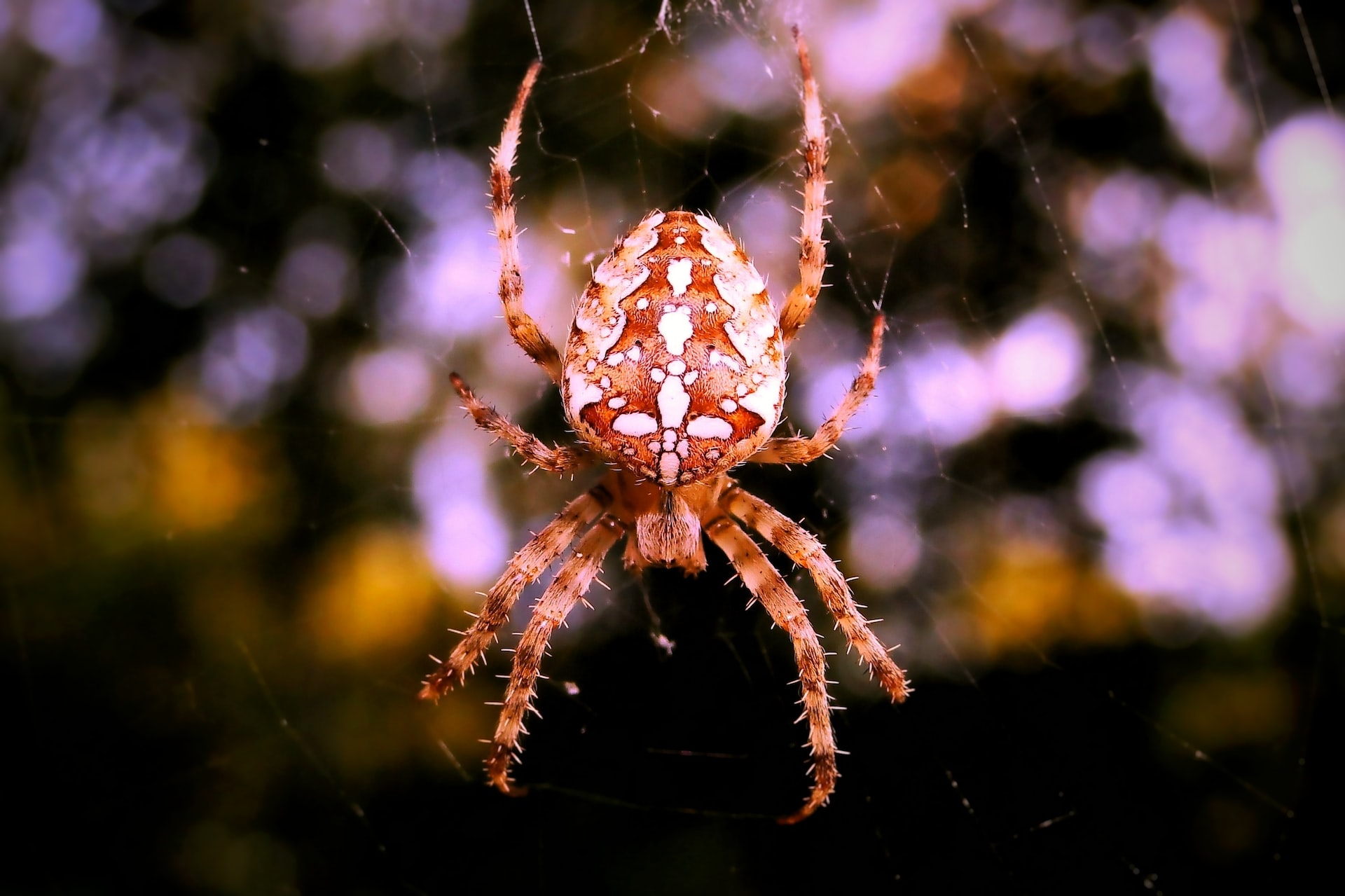Whether or not arachnophobia is irrational or not is a separate discussion. For homeowners dealing with an active spider infestation, it could spell trouble that goes beyond the spiders themselves.
This guide will help identify common spiders in Maryland, understand their behavior, and provide practical tips to get rid of them once and for all.
What are spiders?
Spiders are arachnids that contain two body regions (cephalothorax and abdomen), eight legs, fangs (chelicerae), no wings, and no antennae. Most, but not all, spiders have eight eyes.
Like insects, spiders are arthropods, meaning they have an exoskeleton (the skeleton is located on the outside of their body). Spiders do not have chewing mouthparts. Instead, they use digestive enzymes in their saliva to break down their food before eating it.
Since spiders are arachnids, they are closely related to mites, ticks, and scorpions. Depending on their exact species, spiders come in a wide range of colors and color patterns.

Are spiders dangerous?
All spiders are venomous, but not all spiders pose a danger to people. In fact, most species of spiders living in and around homes are nuisance spiders. The venom that is injected from the bite of nuisance spiders is not strong enough to cause health problems in people.
Spiders are naturally reclusive, and they try to stay away from people as much as possible. A bite typically only occurs when you make accidental contact with spiders, or if you are handling them (not recommended).
It is important to note that there are dangerous species of spiders found living throughout the United States. The venom that is injected during a bite from dangerous spiders is strong enough to cause significant health consequences in people and will require medical attention.
Why do I have a spider problem?
Spiders are attracted to properties that offer them plentiful places to live and forage for food. Gardens, wood piles, heavy vegetation, and large populations of insects can all attract spiders to properties, allowing them to thrive.
Therefore, the presence of spiders typically indicates the presence of other insects. While you could keep these handy critters around as natural pest prevention, the last thing you want is a lot of spiders competing with a lot of insects for supremacy in your home.
Once spiders are living and feeding on your property, there is a good chance they will find their way into your home after following food sources (insects) inside.
Signs of a spider infestation
- Webs: The most common sign of spiders is the presence of large webs across your property. These are most commonly found in undisturbed areas of your home where spiders have ample time to spin their webs.
- Egg sacs: Spider egg sacs are small, silk-like structures that spiders use to lay their eggs. Finding these sacs in and around your home suggests a spider population.
- Bites: While not all spiders are harmful to humans, some can bite and cause reactions. If you notice unexplained bite marks, especially if they become red or swollen, it may indicate the presence of biting spiders.
- Prey insects: Spiders feed on other insects. If you have a significant spider population, you may notice an increase in other insect pests as well.
- Sightings: Obviously, seeing multiple spiders in your home is a strong indicator of an infestation. Keep in mind that some spiders are more reclusive and may hide in dark, quiet areas.
Where will I find spiders?
Spiders are often divided into two different categories, depending on their hunting style: web-building spiders or hunting spiders. Hunting spiders do not build webs. Instead, they chase and hunt down their prey. Hunting spiders create burrows in the ground underneath soil, mulch, and under rocks or thick vegetation. They hide inside their burrows, waiting for prey to happen by. Web-building spiders like to create webs in gardens, shrubs, bushes, tall grasses, between rocks and stones, and in wood piles.
Spiders that have found their way inside homes and other buildings (sheds, garages, barns) prefer to hide out in dark, quiet places, such as in the corners of closets, in basements, in boxes, in clothing and shoes, under bedding and furniture, in attics, behind wall voids, in crawl spaces, and underneath sinks.
How can I prevent spiders in the future?
Preventing problems with spiders can be tricky. Here are several things you can do in and around your home to deter their presence:
- Put into place a professional residential or commercial spider control program from Pest Czar.
- Cut tree branches and bushes away from the outside of your home.
- Place woodpiles and garden areas a distance away from the exterior of your home.
- Remove water sources from your property.
- Maintain your lawn.
- Seal gaps or cracks in the foundation and exterior walls of your home.
- Make sure that weather stripping is in place around all exterior windows and doors.
- Replace any torn window or door screens.
How do I get rid of spiders?
To remove active spiders you can consider vacuuming them up, applying an insecticide around your home, or even dispersing some peppermint oil.
Otherwise, to eliminate spiders from your home or property and prevent a re-infestation, partner with a knowledgeable professional. At Pest Czar, our local and experienced professionals can provide the comprehensive pest control services needed to find and get rid of the spiders living in your home, outbuildings, or on your property. We can then prevent their return by implementing one of our GreenPro-certified pest protection plans. For exceptional, eco-friendly spider control services in the Baltimore Metro area of Maryland, reach out to us at Pest Czar!
FAQs: Common Household Spiders
How can I distinguish between harmless and venomous spiders?
Identifying different spiders is important in determining whether or not they are venomous. For example, the most common venomous spider in the US is the black widow, which can be identified by its jet-black body and red abdomen.
What are the best natural remedies for spider control?
Peppermint oil is good at repelling spiders, as well as cleaning products with vinegar or dish soap. Spreading diatomaceous earth is another good remedy around cracks and crevices to prevent spider entry into your home.
Can spiders be beneficial for indoor plant care?
In many cases, spiders may actually benefit potted plants by eliminating insects that carry pathogens that harm plants.
Helpful Articles
Are You Seeing A Lot Of Spiders Around Your Home?
How To Keep Spiders Out Of Your Baltimore Home?
Six Simple & Effective Spider Control Tips For Baltimore Homes
Get Started Today with a Free Quote
Complete the form below to schedule your no obligation inspection.
- Zero-Contact Service
- Same-Day Inspection/Service
- Real-Time Notifications

Customer Reviews
“Joe is knowledgeable and professional. Thanks for the great service!”
Adam | Reisterstown, MD | Read Reviews


